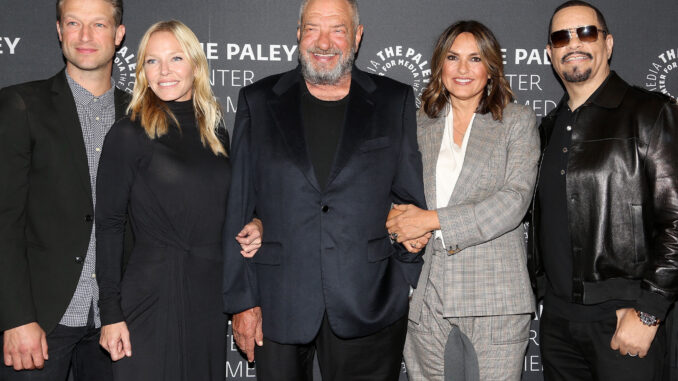
The golden gleam of an Emmy stage, usually reserved for the breathless reveal of a victor or the poignant embrace of a lifetime achievement, occasionally becomes a crucible for something far more potent: the forging of collective memory. Such was the case during a recent Emmys tribute, a meticulously crafted moment dedicated to celebrating the enduring legacy of "Law & Order: Special Victims Unit" (SVU), when the long-awaited reunion of its most iconic stars sent a ripple of electric nostalgia through the very fabric of television history.
The air in the auditorium, already charged with the nervous energy of awards season, hummed with a different kind of anticipation when the tribute began. For twenty-five years, SVU has been more than just a crime drama; it has been a cultural touchstone, a relentless mirror reflecting society’s most difficult truths, and a consistent presence in millions of homes. Yet, for a significant portion of that quarter-century, its heartbeat was undeniably the fraught, profound partnership of Detective Olivia Benson and Detective Elliot Stabler. So, when Mariska Hargitay and Christopher Meloni stepped onto that stage together, a collective gasp, swiftly followed by a roar, reverberated not just through the room, but across living rooms worldwide.
Their entrance was not merely a walk; it was a reclamation. Hargitay, embodying the resilient strength that defines Benson, and Meloni, with Stabler’s characteristic brooding intensity softened by a decade’s absence, reunited with an easy camaraderie that felt both intimately familiar and exhilaratingly new. The years had sculpted new lines on their faces, but had done nothing to diminish the undeniable chemistry that had once flickered, raged, and simmered between their characters. The way their eyes met, the natural flow of their banter, the shared smiles that crinkled at the corners of their eyes – it wasn't an act for the cameras. It was the palpable warmth of genuine friendship, a testament to a bond forged in the trenches of demanding storytelling and cemented by shared experience. It felt, to an audience who had invested so deeply in their fictional lives, like a collective exhale.
This reunion was more than just two actors sharing a stage; it was a potent illustration of SVU's expansive legacy. The show's success is not simply measured in its unprecedented run, but in its unwavering commitment to shining a light on the darkest corners of human experience, giving voice to the voiceless, and advocating for justice. Hargitay, as Olivia Benson, became an icon of female resilience, her character’s journey from rookie detective to captain mirroring the evolution of an audience’s understanding of trauma and recovery. Meloni, as Elliot Stabler, anchored the show's early years with a raw, often volatile portrayal of a detective grappling with the emotional toll of his work, reflecting the very human cost of fighting evil. Together, they represented the core of the show’s mission: a relentless pursuit of truth, underpinned by compassion.
The Emmy stage, therefore, became a hallowed ground for fan service and cultural validation. For viewers, seeing Benson and Stabler together again was a powerful jolt of nostalgia, conjuring memories of late-night binges, passionate debates about their unspoken affections, and the comfort of a fictional world that felt deeply real. It wasn't just about the characters, but the feeling they evoked – the comfort of familiarity, the longing for what was, and the joy of seeing old friends pick up a conversation as if no time had passed. Their reunion transcended the typical awards show segment; it was a visceral reminder of television’s power to create indelible characters and narratives that become intertwined with our own lives.
In essence, the Emmys tribute to SVU, punctuated by the magnetic reunion of Mariska Hargitay and Christopher Meloni, was a beautifully orchestrated ode to longevity, impact, and the enduring power of partnership. It illustrated how a television show can evolve from entertainment into a cultural institution, and how its stars can transcend their roles to become beloved figures who, even years apart, can ignite a collective spark with a single glance. It was a golden moment on a glittering stage, proving that some legacies, like some partnerships, are truly timeless.
